Next weekend, Jersey City Theatre Center presents the one-woman play “SHE GON’ LEARN” – a poignant, funny and universal story about youth, sexual awakening, racial realities and the insanity of dating. I had the chance to chat with the writer and performer, Lisa Rosetta Strum about the upcoming play.
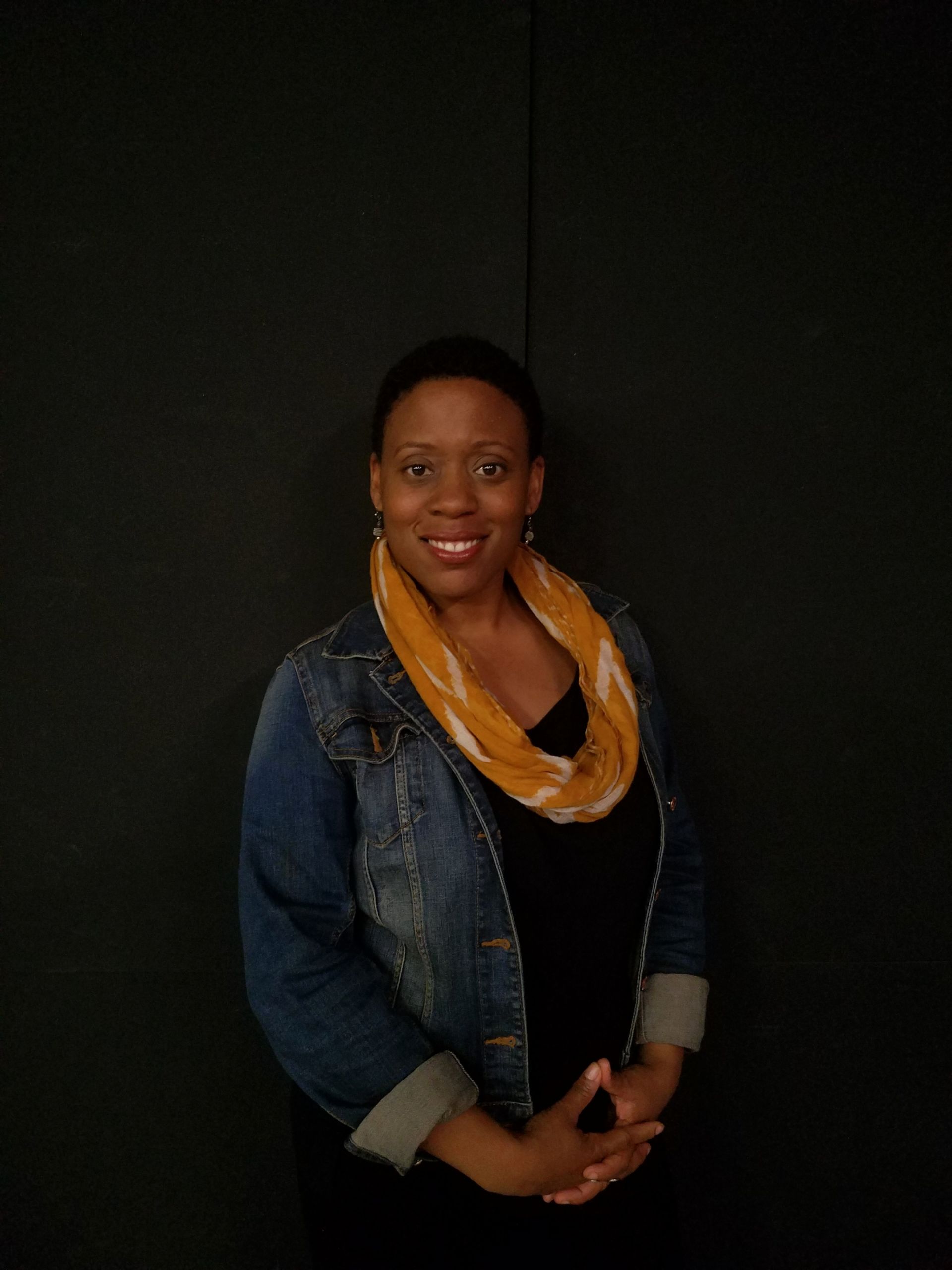
Do You Live in Jersey City?
I do. I actually live seven minutes away from here. I live on Newark and First. So if it’s a slow walk it’s about seven minutes, if it’s a very brisk walk, it’s about five minutes.
Tell me about yourself.
Well, I am a theater artist, a teaching artist, a producer. I’m a writer, I’m a singer, I’m an actress. But I have no visual arts abilities at all. My fingers just draw stick people.
Do you write outside of theater?
Well actually this show, “She Gon’ Learn,” started through poetry. I’d be on MTA and – I called them poetic tirades – I just started writing all sorts of things that I was feeling and then that turned into what this is now. The poems are based on just being annoyed with men and being treated like a piece of meat, disappointments in love, wanting love, mistakes that I had made, and that sort of thing. I went back and read them and I thought, “Oh, there could be some sort of show here.” So you know, when the student is ready, the teacher will show up. So then I started meeting teachers and started taking classes and developing, piece by piece by piece.
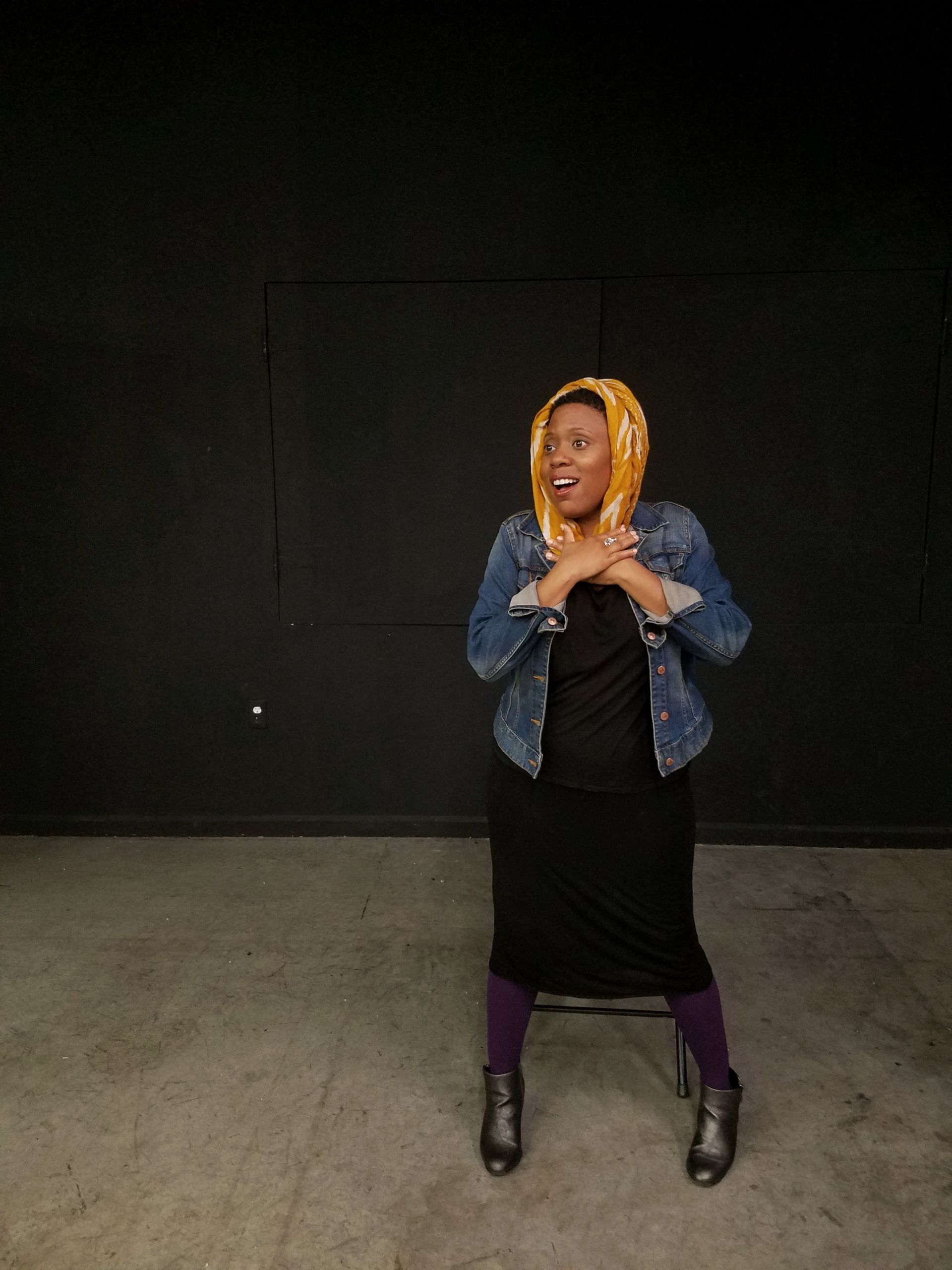
So that’s interesting, you would get catcalled on the subway and turn it into a poem and feel empowered by creating art around that.
Absolutely. Absolutely. The poem that happens in the beginning of the show is based on an actual experience. I was walking from my apartment to the train and some guy asked me to smile. I had this look on my face, I was just annoyed, like “why are you catcalling at me? Just leave me alone.” So yeah, taking that power back, and just using what you experience on a daily basis to influence your art.
Why do you think it’s offensive when a man asks you to smile?
Because it puts women in this state of expectation – that your only purpose is to please a man aesthetically. Women should be happy. We aren’t supposed to have a bad day. Smile. But if I don’t feel like smiling, I don’t feel like smiling. And I understand men are flirty, they’re doing their thing, but just let me be who I want to be. Let me express myself. Let me just be my authentic self. To tie it back to the show, the show is about allowing myself to be authentic without being concerned about the male gaze. It’s offensive because we should be able to just be who we are, what we want to be and not have to worry about pleasing anybody.
Right. We don’t owe them anything.
We don’t owe them anything at all.
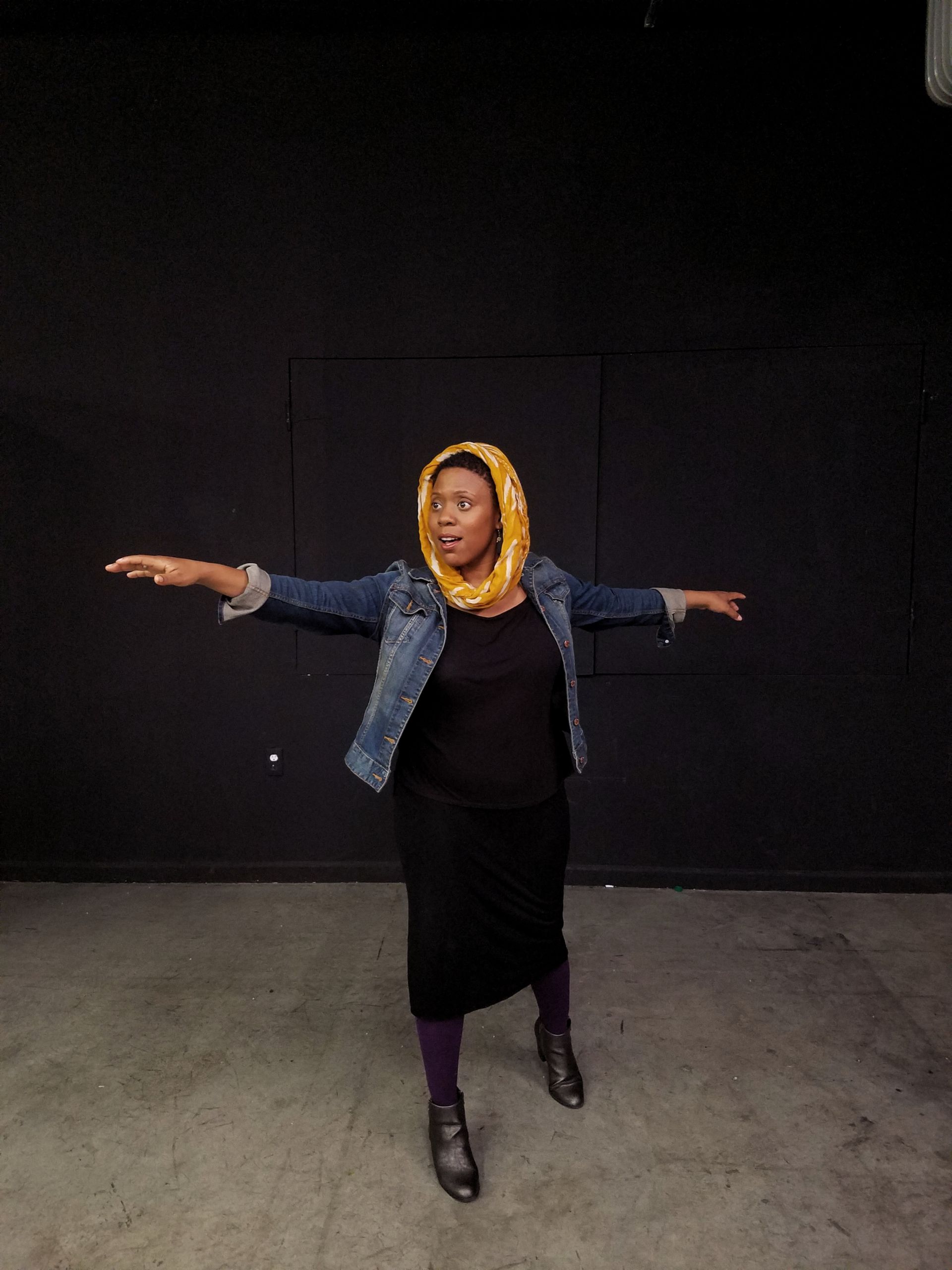
So is this play a part of JCTC’s Disruption series? The visual art (in the Merseles Studios Art Gallery) seems political, but your piece seems more personal.
It’s personal, but I think it’s political too, whenever you’re considered an “other.” When you’re not white, male, cisgender, you’re considered “other,” so I think talking about representing yourself outside of the roles that society has deemed for you, is being disruptive. I’m talking about dating, sexuality, revealing some stereotypes that black women experience. Without giving the show away, she learns some hard truths. She’s exposed to people’s ideas of her. She’s dealing with some self-esteem issues. Growing up in a world that doesn’t see you as being beautiful, because you’re not the standard, is part of the journey.
So you said the play started with a poem about your own experiences, so is the play autobiographical?
It is semi-autobiographical. It’s based on actual events, there are real people in this play. It was based on an experience I had that forced me to do some self-inventory to figure out why I keep running into the same situation. Have you heard the saying: “you’re dating the same person over and over again, they’re just in different clothes?” That’s kind of what happened. She doesn’t see why she keeps doing it. Part of the arc of the show is that, eventually, she begins to see that she’s making this mistake. We want to be in love. We’re always so fascinated with love and love and love and love and love – but love is blind, right? And sometimes we don’t always know what those motivations are about. Maybe we’re listening to the wrong parts of ourselves. And also what we’re willing to put up with in order to have love. I think, as women, we put up with a lot. We keep our mouths closed, that’s another theme. A lot of times something happens and because you want to be nice, you don’t say anything, but it bothers you. So there’s a journey of self-discovery, there’s a journey of self-esteem, there’s a journey of finding her place, there’s a journey of her learning about herself.
So it’s a lot about your own personal journey. What do you hope that people take from your play who may be the people who objectified or stereotyped you? What do you hope that people can learn from this play?
I play a lot of men in this show. It will be interesting for men to see, from a woman’s gaze, how they deal with women. I think it will be interesting for women to see themselves deal with men. So I think the play acts like a mirror for whomever the viewer is. Whether it’s “I’ve had that experience,” or “I’ve dated that guy,” “I’ve done that.” I want people to walk away with a sense that they’re walking into their own personal experiences as well. Yes it’s mine, but it’s universal. Or maybe, if they don’t recognize it, they can learn something about somebody else or have a different perspective if they weren’t aware.
You describe your play as being about “dating while black.” What does that mean?
Just dealing with the stereotypes that black women deal with. There was an article a couple of years ago about OKCupid and it said that black women have a difficult time dating online. Black women are also sexualized and fetishized too. There’s a lot of assumptions about our sexual prowess. Historically, how our bodies have been treated in this country – either for labor or not having any agency – I think that carried on throughout the decades. Oh “black women are easy” or “black women are really animalistic in bed.” And then also having to deal with the standard of beauty, and how you fit in with that.
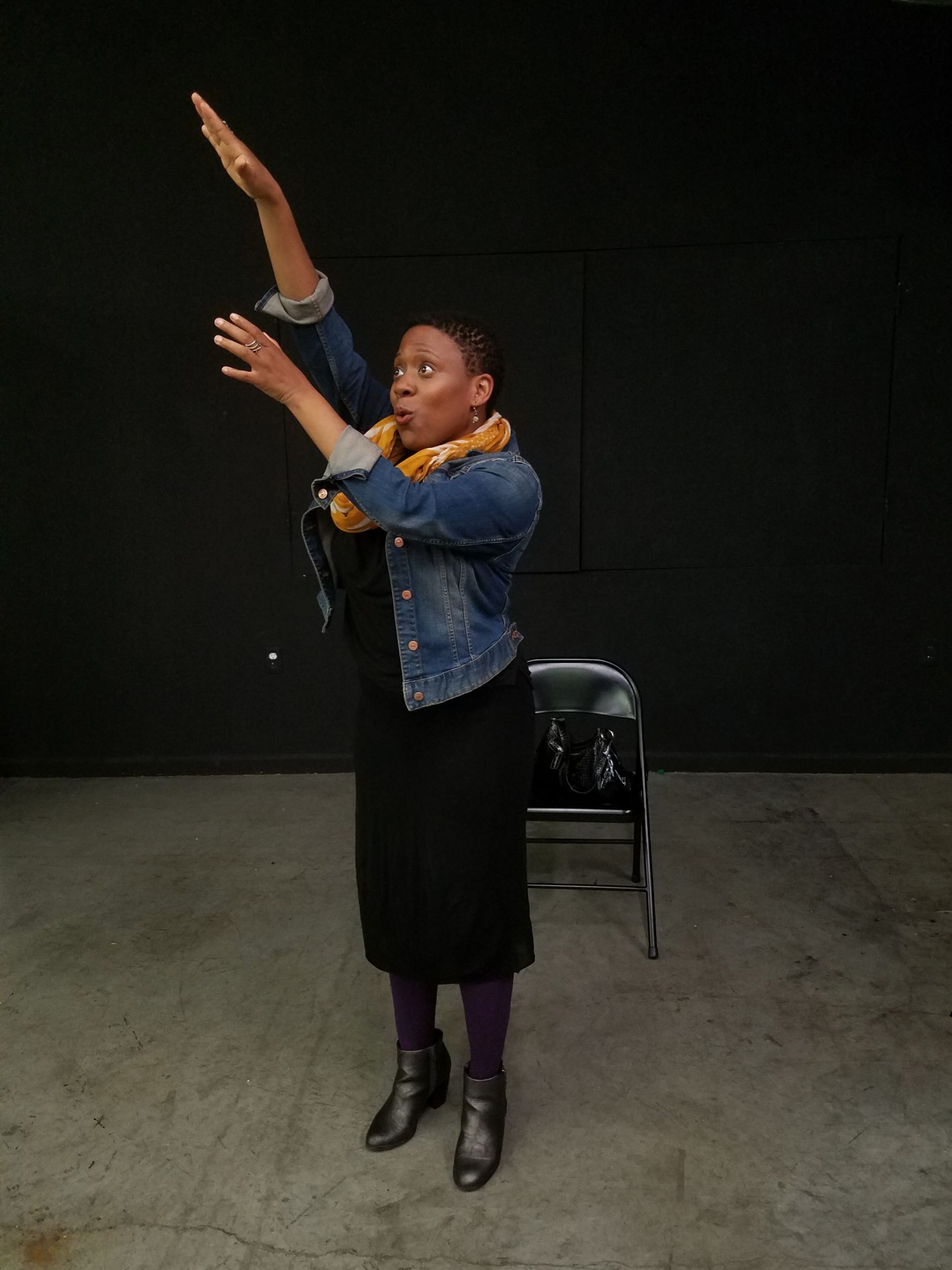
How does the play explore female empowerment?
I think it goes back to having the space to be authentic. Speaking your truth. I think it’s an empowering thing to say what you want to say and how you want to say it, and not filter yourself and not edit yourself. And to be vulnerable. And take up space. And even just doing a one person show… To me I see a lot of symbolism: what does it mean to take up space in a one-woman show where you’re playing different people and you’re telling a personal story, a story that’s based on personal events? And you’re being unapologetic about it, you’re being messy about it, you’re putting it out there.
There’s something you said about being vulnerable. What was the creative process like in terms of deciding to put yourself out there like that?
For me it was the desire to do work and to perform because it’s part of my DNA, it’s what I need to do – you know, as a dancer. It was also an opportunity for me to be in control. I didn’t have to ask anyone’s permission, I just had to decide that I was going to wake up and say I’m going to do this, come hell or high water. It was scary. In the earlier drafts, I left out story of the main relationship that you’ll see in the play because I thought it was too vulnerable and I didn’t know if I wanted to expose myself that way. But my Director said no, you have to say it. Just do it. And I did it. And nobody judged me. And no one thought it was self-indulgent because it is a one-woman show but I’m not preaching to the audience, it’s a play.
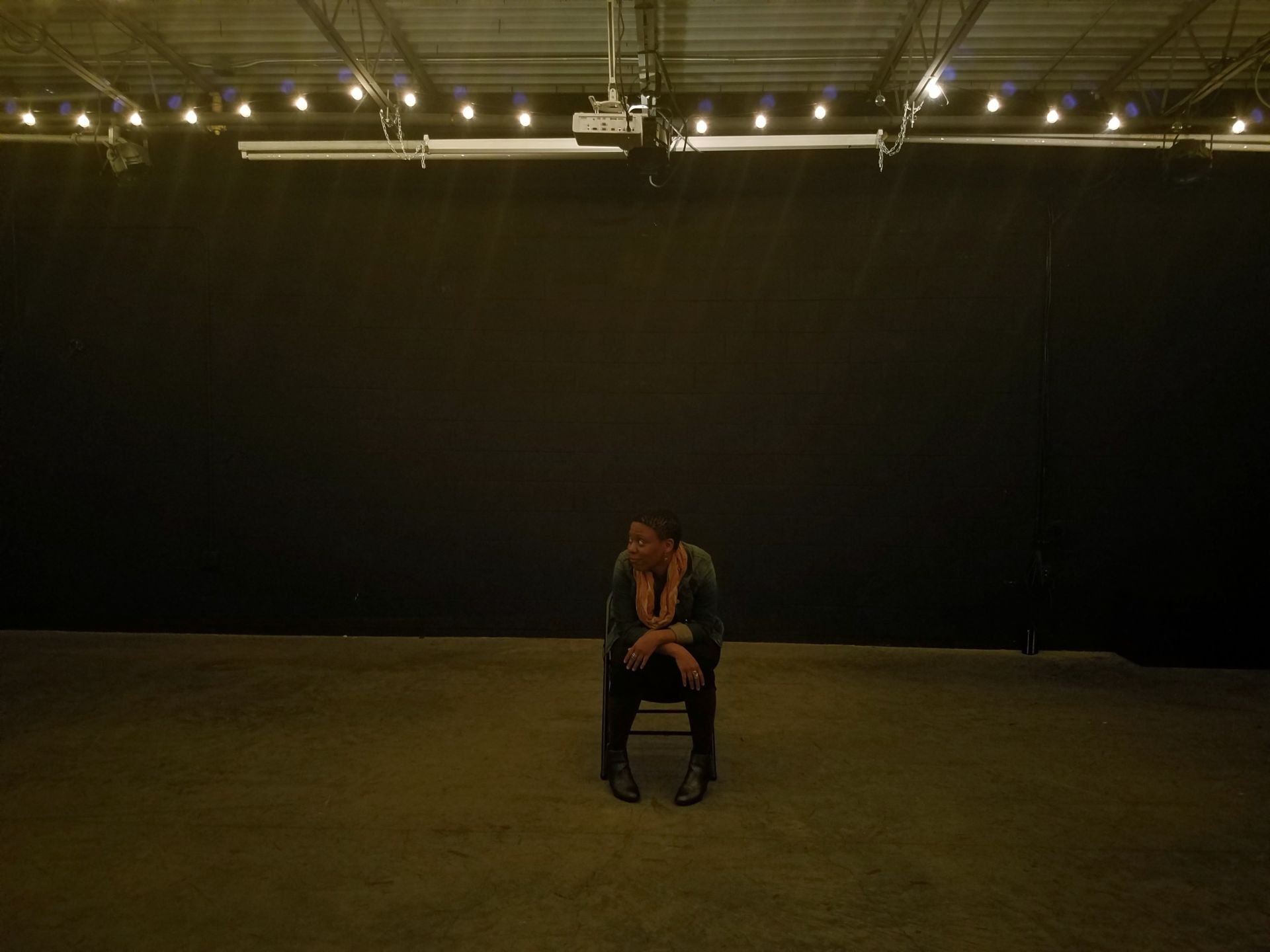 A lot of it was just trusting your process, trusting that people wanted to hear this story. Like you said, why would anyone want to hear my story? I think it’s because people come to the theater to have a cathartic experience. They want to see themselves. Even though it’s not themselves personally, I don’t think that we have been through anything that other people have not gone through. It’s simply a variation on many, many, many themes. You realize that it frees other people. My director friend says the reason why plays exist is because things happen on this particular day that have never happened on any other day. The theater is, for artists, our church. There’s a sacredness. Why not be in a space where you are confessing -your deepest darkest feelings, your secrets, your vulnerabilities? Why not?
A lot of it was just trusting your process, trusting that people wanted to hear this story. Like you said, why would anyone want to hear my story? I think it’s because people come to the theater to have a cathartic experience. They want to see themselves. Even though it’s not themselves personally, I don’t think that we have been through anything that other people have not gone through. It’s simply a variation on many, many, many themes. You realize that it frees other people. My director friend says the reason why plays exist is because things happen on this particular day that have never happened on any other day. The theater is, for artists, our church. There’s a sacredness. Why not be in a space where you are confessing -your deepest darkest feelings, your secrets, your vulnerabilities? Why not?
“She Gon’ Learn” runs on June 1, 2 and 3 at Jersey City Theatre Center’s Merseles Studios: 339-345 Newark Avenue, 2nd floor.
For ticket information, visit the JCTC website.
Follow “She Gon’ Learn” on Facebook.
You must be logged in to post a comment.